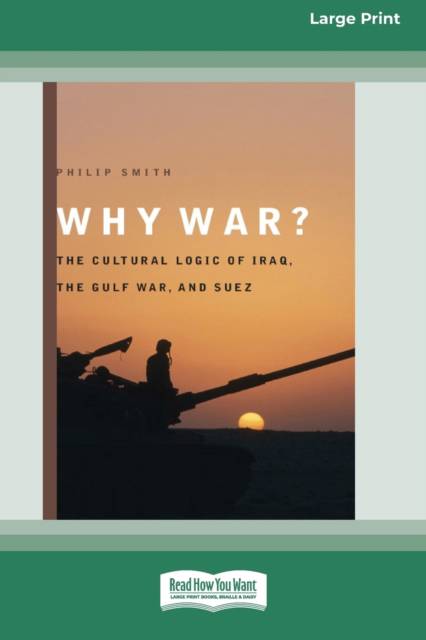
- Afhalen na 1 uur in een winkel met voorraad
- Gratis thuislevering in België vanaf € 30
- Ruim aanbod met 7 miljoen producten
- Afhalen na 1 uur in een winkel met voorraad
- Gratis thuislevering in België vanaf € 30
- Ruim aanbod met 7 miljoen producten
Zoeken
Why War?
The Cultural Logic of Iraq, the Gulf War, and Suez [Standard Large Print 16 Pt Edition]
Philip Smith
Paperback | Engels
€ 80,45
+ 160 punten
Omschrijving
Why did America invade Iraq? Why do nations choose to fight certain wars and not others? How do we bring ourselves to believe that the sacrifice of our troops is acceptable? For most, the answers to these questions are tied to struggles for power or resources and the machinations of particular interest groups. Philip Smith argues that this realist answer to the age - old ''why war?'' question is insufficient. Instead, Smith suggests that every war has its roots in the ways we tell and interpret stories. Comprised of case studies of the War in Iraq, the Gulf War, and the Suez Crisis, Why War? decodes the cultural logic of the narratives that justify military action. Each nation, Smith argues, makes use of binary codes - good and evil, sacred and profane, rational and irrational, to name a few. These codes, in the hands of political leaders, activists, and the media, are deployed within four different types of narratives - mundane, tragic, romantic, or apocalyptic. With this cultural system, Smith is able to radically recast our ''war stories'' and show how nations can have vastly different understandings of crises as each identifies the relevant protagonists and antagonists, objects of struggle, and threats and dangers. The large - scale sacrifice of human lives necessary in modern war, according to Smith, requires an apocalyptic vision of world events.
Specificaties
Betrokkenen
- Auteur(s):
- Uitgeverij:
Inhoud
- Aantal bladzijden:
- 706
- Taal:
- Engels
Eigenschappen
- Productcode (EAN):
- 9780369361332
- Verschijningsdatum:
- 22/08/2011
- Uitvoering:
- Paperback
- Formaat:
- Trade paperback (VS)
- Afmetingen:
- 156 mm x 234 mm
- Gewicht:
- 875 g

Alleen bij Standaard Boekhandel
+ 160 punten op je klantenkaart van Standaard Boekhandel
Beoordelingen
We publiceren alleen reviews die voldoen aan de voorwaarden voor reviews. Bekijk onze voorwaarden voor reviews.








